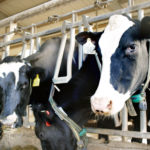Summary
Current Research
Dairy is an important industry, especially for North Central Texas. Our Center’s research focuses on numerous aspects of dairy production, from forage production, cow nutrition, cow comfort, to environmental challenges. There are many opportunities to learn more about dairy and cows through educational events and monthly articles found under Texas Dairy Matters.
Dairy Cow Comfort
Cows at the Southwest Regional Dairy Center are milked 3 times daily on a 24-cow rotary milking parlor. This type of parlor can help improve efficiency by keeping workers on a timed pace as well as provide a stress-free environment for cows.
To support milk production, dairy cows consume more than 50 pounds of feed per day. Feed for dairy cows at the Southwest Regional Dairy Center consists of high-quality hays, corn, oats, and other grains as well as vitamin and mineral supplements. Fresh feed and clean water are available to cows 24 hours per day only a few steps from their free-stall beds.
An additional benefit of free-stall housing is the ability to cool cows during the warmer months of the year.
Recovering Nutrients from Agrarian Waste
We are conducting research, led by Dr. Eunsung Kan, on recovering nutrients from agricultural wastes (i.e., dairy effluents) via engineered biochar. The biochar enhanced with various metal oxides is used to make an active recovery of nutrients from agrarian wastewater for recycling nutrients to crop fields as well as preventing a release of nutrients to environments.
The home-made biochar coated with metal oxides showed high recovery of nutrients from dairy effluents. Also, the nutrient-saturated biochar led to enhancement of crop growth, soil fertility, and diversity of the microbial community in crop fields.
High-phosphorus Soil Phytoremediation
We have examined the role of cool- and warm-season forages in recycling phosphorus of dairy manure/effluent/compost origin back to the dairy cow. This research is led by Dr. Jim Muir, Interim Resident Director and Grassland Ecologist and Plant Scientist.
Dairy Cow Nutrition
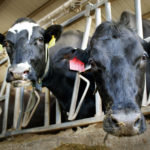
Northcentral Texas climates allow for cool, and warm season forages for the dairy industry so forages, and their efficacy for feed is a year-round challenge. Our center is rising to meet this challenge with research by our center director and forage researcher Dr. Jim Muir and Dr. Brandon Smith a ruminant nutrition professor at Tarleton State who cooperates with the center on forage-based dairy nutrition projects.
Texas Dairy Matters
Texas Dairy Matters is a website resource provided by the Texas A&M AgriLife Dairy Extension team providing the Texas Dairy Industry with recent events, fact sheets, DOPA information and much more. You can also sign up for our quarterly newsletter which will showcase recent events, upcoming events and essential fact sheets to aid the Texas dairy industry in making informed decisions. Texas AgriLife Extension Service offers practical, how-to education based on university research and it’s available to any resident of Texas.
Lessons provide research-based education and information on effective manure, mortality, and process generated wastewater management from livestock and poultry operations to protect air and water quality. Participants will learn the various animal waste handling, storage, treatment and utilization processes and systems, best management practices and available technologies to reduce air and water pollution from animal feeding operations.
Monthly articles are written by the two Dairy Extension Specialists. These articles discuss any topics that might be impacting producers or informing them about new and innovative management strategies.
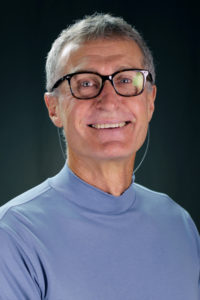
Dr. Jim Muir, Regents Professor in Grassland Ecology

Dr. Eunsung Kan, Associate Professor of Environmental Engineering—Dairy Production
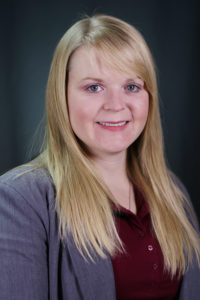
Jennifer Ann Spencer, MS, Ph.D. Assistant Professor, and Dairy Extension Specialist
Dr. Barb Jones
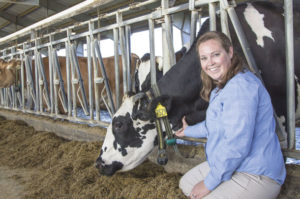
Professor at Tarleton State University and researcher at Texas A&M AgriLife Research.
Team Members
- Dr. Brandon Smith, Assistant Professor and Ruminant Nutritionist
- Dr. Eunsung Kan, Associate Professor, and Biological Engineer
- Dr. Jim Muir, Regents Professor in Grassland Ecologist, and Plant Scientist
Grants
- Grant #1

